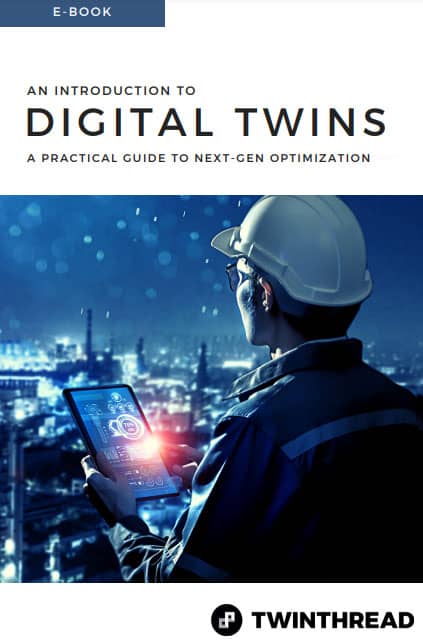It’s safe to say that 2023 was the year of artificial intelligence. While all the media hype focused on Generative AI, TwinThread has quietly deployed “Industrial AI” at scale with leading industrial companies.
For example, today, we serve nearly 50% by revenue of the top 10 global CPG and F&B manufacturing companies. Leaders in this industry use our Virtual Operations Center to save energy, drive material cost savings, increase throughput, and improve quality at a global scale.
Most importantly, they’ve proven that AI is an essential part of their strategy to overcome the challenges that all industrial companies face today with skills and resource shortages. The ability for engineers to work at one physical plant location yet optimize similar processes across all global locations simultaneously is a true game changer.
Consequently, orders for our SaaS technology grew more than four times in Q4 compared to 2022.
What is Industrial AI?
“Generative AI” is a subset of “Industrial AI,” which has a broader range of capabilities and use cases. It takes much more than a large language model to run a plant or complex facility effectively. While a large language model is suitable for search and summarizing large volumes of text, other types of AI models are better at making operating decisions and modeling the true behavior of industrial processes.
The key reason is that different types of AI models capture the essential physical, thermodynamic, chemical, and mechanical relationships governing industrial processes more directly than a large language model could infer. Neural network models, decision forest models, or even simple first principle models might be more suited to make decisions around different industrial processes. In any case, it is imperative to match the right type of AI model to the problem you are trying to solve and the specific industrial process you are optimizing.
Let’s take this concept to the extreme. Suppose you can effectively automate operating decisions with a simple first principle model that uses well-known equations to describe an industrial process in a deterministic way. Why would you take the chance on a more complex model with non-deterministic behavior?
With all the hype in the market around Generative AI and large language models, it is natural to want to play with the “cool” technology. Still, the risks and consequences of misapplying AI are significant.
This is why TwinThread has built several fit-for-purpose AI-enabled industrial applications as part of our Virtual Operations Center. We did this to match the type of AI model to the appropriate problem and process type and to give you everything you need to fully operationalize a solution. We have found that this “AI-enabled application” concept is important to prove the value of AI quickly and scale it across many plants or facilities in a sustainable way.
By matching the type of AI to the problem and process, you have the best chance of successfully driving autonomous operations.
Autonomous Operations: A Reality
A major CPG company successfully deployed our technology and scaled its first autonomous application across all plants and production lines in 2023. This was a major milestone for the company, for TwinThread, and for the industry at large.
Like many in the industrial sector, this customer dealt with a critical shortage of skills and labor that could impact quality and production globally. They proactively and aggressively faced this challenge by creating digital twins of their manufacturing processes and integrating AI, reinforcing their commitment to autonomous operations.
Not only were they able to maintain quality through a massive drop in frontline operations tenure, but they also saved money through yield improvements that paid for the investment several times over.
We both learned many things through deployment that go well beyond the technology. The difference in any successful deployment of this scale is the company’s commitment to innovation and organizational change management.
What’s Next In 2024?
The hype around Generative AI will continue, and we will continue quietly working away with leading industrial companies to deploy Industrial AI at scale. This year, I expect we will bring together multiple types of AI models in our applications to solve different aspects of the same industrial problems faster and with even better results.
We believe all industrial companies will eventually have their own Virtual Operations Center. They’ll bring together skilled engineers from across their organizations - and across the globe - and enable them with the latest AI technologies tailored to solve industrial problems and drive autonomous operations at scale.
It is not a question of whether this technology works. It is a question of which companies and organizations will step up and proactively face the skills and resource shortages and which companies will be left behind.
2023 proved that the pace of change in the industrial world is staggering, and the separation between leaders and laggards will grow with unprecedented speed in 2024.
We don’t want to just work with the leading industrial companies; we want to be part of why the leaders are leading. It is very rewarding for me to see what TwinThread and our customers accomplished in 2023, and while there is still uncertainty in the world and in our industry, I am extremely optimistic about where we are headed together in 2024.
Tags:
Blog, Digital Twin, Equipment, Manufacturers, IIoT, AI, Contextualization, Visualization, ML, Operationalize
January 11, 2024
Beyond his professional achievements, Erik has left an indelible mark on academic communities. During his time in Charlottesville, VA, Erik established a mentorship with the University of Virginia Darden School of Business student startup incubator, iLab, and the Virginia Tech Center for Innovation and Entrepreneurship. To this day, he continues his dedication to evolving the next generation of tech trailblazers.
Erik is also a RedHawk, receiving his undergraduate degree from Miami University in Ohio. He and his family currently call Bozeman, MT home.
